英语词汇辨析1
- 格式:doc
- 大小:59.50 KB
- 文档页数:7
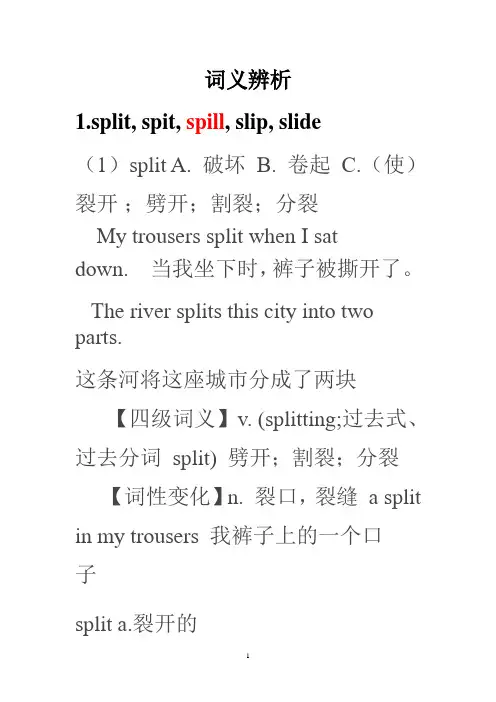
词义辨析1.split, spit, spill, slip, slide(1)split A. 破坏 B. 卷起 C.(使)裂开;劈开;割裂;分裂My trousers split when I sat down. 当我坐下时,裤子被撕开了。
The river splits this city into two parts.这条河将这座城市分成了两块【四级词义】v. (splitting;过去式、过去分词split) 劈开;割裂;分裂【词性变化】n. 裂口,裂缝 a split in my trousers 我裤子上的一个口子split a.裂开的(2)spit A. 吐出 B. 扔 C. 洒If I were a cloud, I would spit out the thinnest thread to weave a web in the field.假如我是一朵云,我就要吐出最细的雨丝,让它在田野上织一张网。
It is very rude to spit in public.在公共场合随地吐痰是很粗俗的行为。
【四级词义】v. (spitting, spat或spit)吐,吐出【巧记】s+pit(坑)= 我使劲(s)地把口水吐到坑(pit)里。
【词性变化】n. 口水【词义扩展】(如果吐出来的是语言)即突然说出 He spat out an insult (侮辱)and hurt her feelings. 他突然口出恶语,让她十分伤心。
(3)spill A. 保存 B. 分开 C. 洒;溢出,溅出,倒出One is not supposed to cry over spilled milk. 对着已经洒了的牛奶哭是无济于事的。
The glass was so full that the juice spilt.杯子装得太满了,果汁都溢出来了。
【四级词义】v. (spilling, spilt或spilled)洒,使溢出,溅出,倒出【巧记】sp+ill=只有撕破(sp)了的(ill)坏的东西才被倒出来。
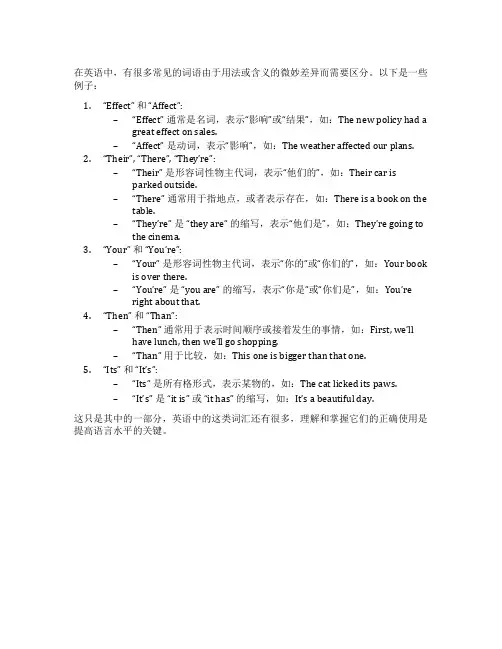
在英语中,有很多常见的词语由于用法或含义的微妙差异而需要区分。
以下是一些例子:1.“Effect” 和“Affect”:–“Effect” 通常是名词,表示“影响”或“结果”,如:The new policy had a great effect on sales.–“Affect” 是动词,表示“影响”,如:The weather affected our plans. 2.“Their”, “There”, “They’re”:–“Their” 是形容词性物主代词,表示“他们的”,如:Their car isparked outside.–“There” 通常用于指地点,或者表示存在,如:There is a book on the table.–“They’re” 是“they are” 的缩写,表示“他们是”,如:They’re going to the cinema.3.“Your” 和“You’re”:–“Your” 是形容词性物主代词,表示“你的”或“你们的”,如:Your book is over there.–“You’re” 是“you are” 的缩写,表示“你是”或“你们是”,如:You’re right about that.4.“Then” 和“Than”:–“Then” 通常用于表示时间顺序或接着发生的事情,如:First, we’ll have lunch, then we’ll go shopping.–“Than” 用于比较,如:This one is bigger than that one.5.“Its” 和“It’s”:–“Its” 是所有格形式,表示某物的,如:The cat licked its paws.–“It’s” 是“it is” 或“it has” 的缩写,如:It’s a beautiful day.这只是其中的一部分,英语中的这类词汇还有很多,理解和掌握它们的正确使用是提高语言水平的关键。
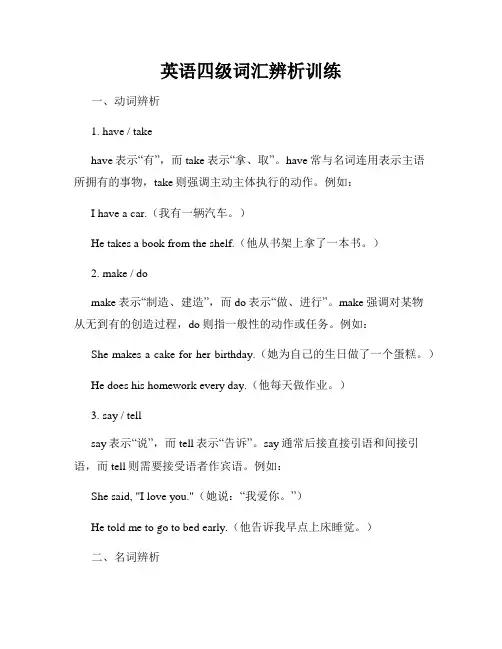
英语四级词汇辨析训练一、动词辨析1. have / takehave表示“有”,而take表示“拿、取”。
have常与名词连用表示主语所拥有的事物,take则强调主动主体执行的动作。
例如:I have a car.(我有一辆汽车。
)He takes a book from the shelf.(他从书架上拿了一本书。
)2. make / domake表示“制造、建造”,而do表示“做、进行”。
make强调对某物从无到有的创造过程,do则指一般性的动作或任务。
例如:She makes a cake for her birthday.(她为自己的生日做了一个蛋糕。
)He does his homework every day.(他每天做作业。
)3. say / tellsay表示“说”,而tell表示“告诉”。
say通常后接直接引语和间接引语,而tell则需要接受语者作宾语。
例如:She said, "I love you."(她说:“我爱你。
”)He told me to go to bed early.(他告诉我早点上床睡觉。
)二、名词辨析1. job / workjob指具体的、具体的职业、职责或任务,work表示工作的行为或活动。
例如:He has a good job in a bank.(他在一家银行有一份好工作。
)She works eight hours a day.(她一天工作八小时。
)2. money / cashmoney指的是一般意义上的钱,而cash特指手中的现金。
例如:I don't have enough money to buy a new car.(我没有足够的钱买一辆新车。
)He paid for the meal in cash.(他用现金支付了这顿饭。
)3. friend / colleaguefriend指的是朋友,而colleague表示同事或工作伙伴。
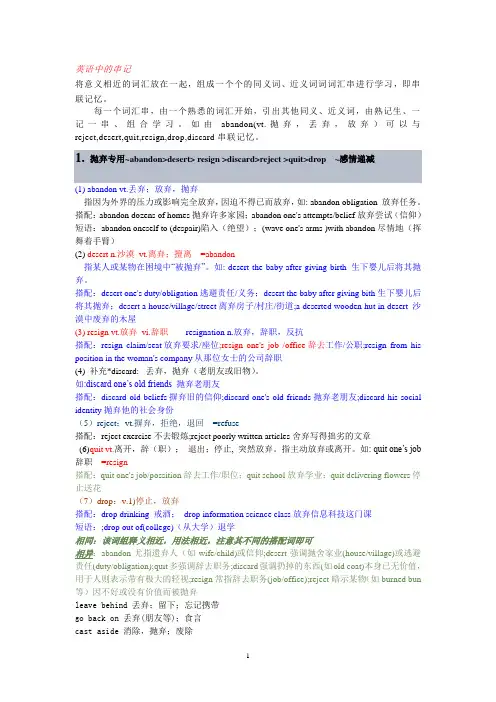
英语中的串记将意义相近的词汇放在一起,组成一个个的同义词、近义词词词汇串进行学习,即串联记忆。
每一个词汇串,由一个熟悉的词汇开始,引出其他同义、近义词,由熟记生、一记一串、组合学习。
如由abandon(vt.抛弃,丢弃,放弃)可以与reject,desert,quit,resign,drop,discard串联记忆。
1.抛弃专用~abandon>desert> resign >discard>reject >quit>drop ~感情递减(1) abandon vt.丢弃;放弃,抛弃指因为外界的压力或影响完全放弃,因迫不得已而放弃,如: abandon obligation 放弃任务。
搭配:abandon dozens of homes抛弃许多家园;abandon one's attempts/belief放弃尝试(信仰)短语:abandon oneself to (despair)陷入(绝望);(wave one's arms )with abandon尽情地(挥舞着手臂)(2) desert n.沙漠vt.离弃;擅离=abandon指某人或某物在困境中“被抛弃”。
如: desert the baby after giving birth 生下婴儿后将其抛弃。
搭配:desert one's duty/obligation逃避责任/义务;desert the baby after giving bith生下婴儿后将其抛弃;desert a house/village/street离弃房子/村庄/街道;a deserted wooden hut in desert 沙漠中废弃的木屋(3) resign vt.放弃vi.辞职resignation n.放弃,辞职,反抗搭配:resign claim/seat放弃要求/座位;resign one's job /office辞去工作/公职;resign from his position in the woman's company从那位女士的公司辞职(4) 补充*discard: 丢弃,抛弃(老朋友或旧物)。
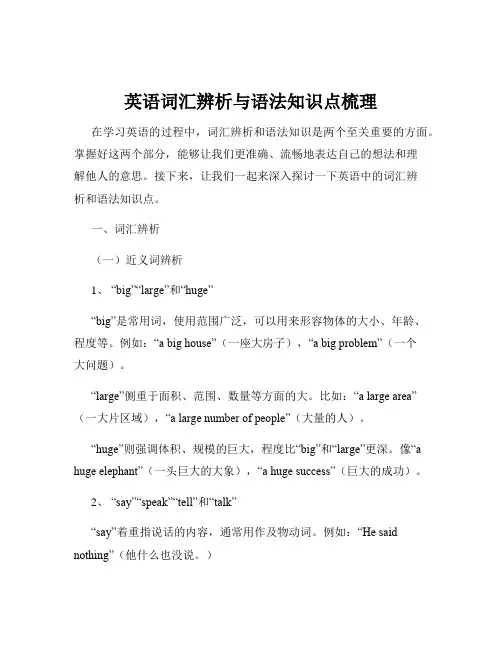
英语词汇辨析与语法知识点梳理在学习英语的过程中,词汇辨析和语法知识是两个至关重要的方面。
掌握好这两个部分,能够让我们更准确、流畅地表达自己的想法和理解他人的意思。
接下来,让我们一起来深入探讨一下英语中的词汇辨析和语法知识点。
一、词汇辨析(一)近义词辨析1、“big”“large”和“huge”“big”是常用词,使用范围广泛,可以用来形容物体的大小、年龄、程度等。
例如:“a big house”(一座大房子),“a big problem”(一个大问题)。
“large”侧重于面积、范围、数量等方面的大。
比如:“a large area”(一大片区域),“a large number of people”(大量的人)。
“huge”则强调体积、规模的巨大,程度比“big”和“large”更深。
像“a huge elephant”(一头巨大的大象),“a huge success”(巨大的成功)。
2、“say”“speak”“tell”和“talk”“say”着重指说话的内容,通常用作及物动词。
例如:“He said nothing”(他什么也没说。
)“speak”常指说某种语言或在公开场合发言。
比如:“She speaks English very well”(她英语说得很好。
)“He will speak at the meeting”(他将在会议上发言。
)“tell”意为“告诉”,常接双宾语。
像“Tell me the truth”(告诉我真相。
)“talk”强调双方交流、交谈,是不及物动词。
例如:“They are talking happily”(他们正愉快地交谈着。
)(二)形近词辨析1、“quite”和“quiet”“quite”意思是“相当;完全”,是一个副词。
例如:“It's quite cold today”(今天相当冷。
)“quiet”意思是“安静的;平静的”,是形容词。
比如:“Keep quiet in the library”(在图书馆保持安静。
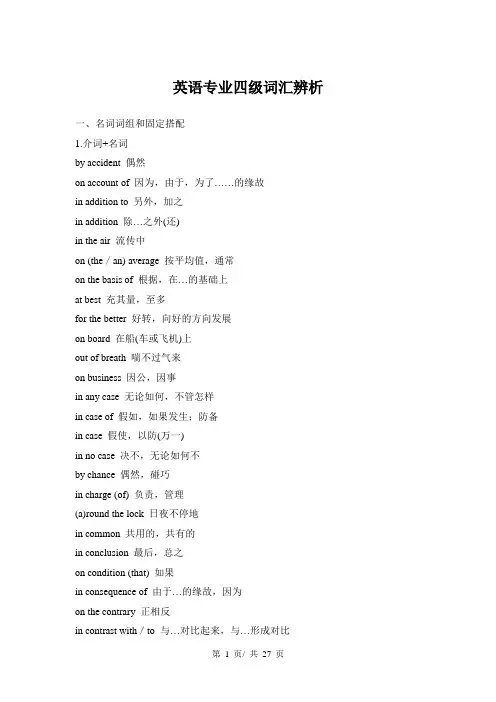
英语专业四级词汇辨析一、名词词组和固定搭配1.介词+名词by accident 偶然on account of 因为,由于,为了……的缘故in addition to 另外,加之in addition 除…之外(还)in the air 流传中on (the/an) average 按平均值,通常on the basis of 根据,在…的基础上at best 充其量,至多for the better 好转,向好的方向发展on board 在船(车或飞机)上out of breath 喘不过气来on business 因公,因事in any case 无论如何,不管怎样in case of 假如,如果发生;防备in case 假使,以防(万一)in no case 决不,无论如何不by chance 偶然,碰巧in charge (of) 负责,管理(a)round the lock 日夜不停地in common 共用的,共有的in conclusion 最后,总之on condition (that) 如果in consequence of 由于…的缘故,因为on the contrary 正相反in contrast with/to 与…对比起来,与…形成对比out of control 失去控制under control 处于控制之下at all cots 不惜任何代价,无论如何at the cost of 以…为代价in the course of 在…过程中,在…期间of course 当然,自然in danger 在危险中,垂危out of danger 脱离危险out of date 过时的,不用的up to date 现代化的,切合目前情况的in demand 非常需要的,受欢迎的in debt 欠债,负债in detail 详细他in difficulties 处境困难in the distance 在远处off duty 下了班(的),不在值班(的)on duty 在上班(的),在值班(的)on earth 究竟,到底at all events 无论如何,不管怎样in any event 无论如何,不管怎样in the event of 万一,倘若for example 例如in the face of 在…面前;不顾in fact 其实,实际上in favo(u)r of 赞同,支持on fire 着火,起火on foot 步行in force 生效,有效;在实施中;大量的in front of 在…面前,在…前面in future 今后,从今以后in the future 在将来in general 一般说来,大体上on (one’s) guard 警惕,提防;站岗,值班in half 成两半at hand 近在手边,在附近by hand 用手,用体力hand down 把…传下去hand in hand 手拉手;密切关联地,同时并进地in hand (工作等)在进行中;在控制中on hand 在手边,在近处on (the) one hand 一方面on the other hand 另一方面at heart 内心里,本质上by heart 凭记性at home 在家,在国内;舒适,无拘束;熟悉,精通in hono(u)r of 为纪念,为了向…表示敬意on/upon one’s hono(u)r 以名誉担保in a hurry 匆忙,急于for instance 例如;比如at intervals 不时,每隔一段时间(或距离)at (long) last 终于at least 至少at length 终于,最终;详细地in (the) light of 鉴于,由于2.动词+名词have/gain access to 可以获得take…into account 考虑到,顾及,体谅take advantage of 占…的便宜,利用pave the way (for) 铺平道路,为…作准备pay attention to 注意do/try one’s best 尽力,努力get/have the best of 战胜make the best of 充分利用get/have the better of 战胜,在…中占上风catch one’s breath 屏息;喘气,气喘;歇口气take care 注意,当心take care of 爱护,照料take a chance 冒险,投机take charge 开始管理,接管keep…company 陪伴take (a) delight in 以…为乐make a difference 有影响,起(重要)作用carry/bring/put into effect 使生效,实行,实现come/go into effect 生效,实施take effect 生效,起作用catch sb’s eye 被某人看到,引起某人注意keep an eye on 留神,照看,密切注意make a face 做鬼脸find fault with 抱怨,挑剔,找岔子catch (on) fire 着火,开始燃烧make fiends (with) 与(…)交朋友be friends with 与…友好make fun of 取笑,拿…开玩笑keep sb’s head 保持镇静in the world 究竟,到底lose sb’s head 慌乱,仓皇失措lose heart 丧失勇气,失去信心get/catch/take hold of 抓住,得到keep house 管理家务throw/cast light on/upon 使人了解,阐明bear/keep in mind 记住have in mind 考虑到,想到make up one’s mind 下定决心,打定主意bring/put into operation 实施,使生效,使运行come/go into operation 施行,实行,生效keep pace (with) 与(…)齐步前进,与(…)并驾齐驱play a part (in) 起作用,参与,扮演角色take place 发生,进行,举行take the place of 代替,取代put into practice 实施,实行make progress 进步,进展give rise to 引起,导致为…的原因make sense 讲得通,有意义,言之有理catch sight of 发现,突然看见(go) on the stage 当演员take one’s time 不着急,不慌忙keep track of 与…保持联系lose track of 失去与…的联系,不能跟上…的进展make use of 利用put to use 使用give way 让路;屈服,让步;倒塌,坍陷make one’s way 前往,行进,去make way 让路,腾出地方或位置3.名词词组的其他形式appeal to 呼吁,恳求attempt at 企图,努力attitude to/towards 态度,看法a great/good deal of 大量,非常,极其influence in 干涉,介入interference with 妨碍,打扰introduction to 介绍a lot (of) 许多(的),大量(的)lots of 大量,许多fall in love (with sb) 爱上(某人)reply to 回答,答复trolley bus 电车I.D. card 身份证credit card 信用卡no doubt 无疑地,很可能next door 隔壁out of doors 在户外face to face 面对面地a few 有些,几个quite a few 不少,相当多a little 一点,一些little by little 逐渐地,一点点地quite a little 相当多,不少no matter 无论the moment (that) 一…(就)no more 不再fair play 公平竞赛,公平对待rest room 厕所,盥洗室primary school 小学side by side 肩并肩地,一起heart and soul 全心全意step by step 逐步地ahead of time 提前all the time 一直,始终once upon a time 从前once in a while 偶尔no wonder 难怪,并不奇怪word for word 逐字地decline with thanks 婉言谢绝二、动词词组和固定搭配1.动词十介词/副词account for 说明…的原因,是…的原因allow for 考虑到,顾及,为…留出预地appeal to 诉诸,诉请裁决(或证实等)arrive at 达成,达成ask after 探问,问起ask for 请求,要求attach to 附属于,隶属于;使依恋,使喜爱to begin with 首先,第一break down 损坏;(健康等)垮掉,崩溃break in 非法闯入;打断,插嘴break into 非法闯入,强行进入break off 中断,突然停止break out 逃脱,逃走;突然出现,爆发break through 突破,冲破;取得突破陛成就break up 印终止,结束;打碎,粉碎;散开,驱散bring about 导致,引起bring down 使落下,打倒;降低,减少bring forth 产生,提出bring forward 提出,提议;提前bring out 使显出;激起,引起;出版,推出bring to 使恢复知觉bring up 教养,养育;提出build up 逐渐积聚,集结;逐步建立;增进,增强burn out 烧光,烧毁…的内部;熄灭burn up 烧掉,烧毁;烧起来,旺起来;(使)发怒call for 叫(某人)来;要求,需要call off 取消call on/up 访问,拜访;号召,要求call up 召集;使人想起;打电话(给)care for 照顾,照料;喜欢carry off 夺走,拿走carry on 继续,进行carry out 实行,执行;实现,完成catch at 试图抓住,拼命抓catch on 理解,懂得;流行起来check in (在旅馆、机场等)登记,报到check out 结帐后离开,办妥手续离去check up (on) 检查,核实cheer up (使)高兴起来,(使)振作起来•clear away 把…清除掉,收拾clear up 清理;澄清,解决;(天)放晴come off 脱落,分开;结果,表现come on [表示鼓励、催促等]快,走吧;开始,发生;进步,进展come out 发表,出版;出现,显露;结果是come round(around) 顺便来访;苏醒,复原come through 经历…仍活着,安然度过come to 苏醒;涉及,谈到;总数为,结果是come up 走上前来;发生,出现count on/upon 依靠,指望count up 共计,算出…的总数cover up 掩饰,掩盖;盖住,裹住cross off/out 划掉,勾销cut across 抄近路穿过,对直通过cut back 削减,缩减;急忙返回cut down 削减,减少;杀死,砍倒cut in 超车抢挡;插嘴,打断cut off 切断,阻碍;使分离,使隔绝cut out 删去,切去;戒除,停止ⅡB用cut short 中断,打断deal with 处理,对付;论述,涉及deep down 实际上,在心底die down 逐渐消失,变弱die out 逐渐消失,灭绝do without 没有…也行,用不着,将就draw in (火车、汽车)到站;(天)渐黑,(白昼)渐短draw up 起草,拟订;(使)停住dress up 穿上盛装,精心打扮;装饰,修饰drop by/in 顺便(或偶然)访问drop off 下降,减少;睡着,入睡;让(…)下车,把…放下drop out 退出,退学dry out (使)干透dry up (使)干透,(使)干涸;(使)枯竭fall behind 落后,落在…的后面fall through 落空,成为泡影fall in 填满;填写;(for)替代fall out 填写;长胖,变丰满find out 查明,找出,发现get across (将…)清楚,(使)被了解get around/round 走动,克服,设法回避(问题等);(协)抽出时间来做(或考虑) get at 够得着,触及;意思是,意指;查明,发现;指责get away 逃脱;走开,离开;(iwth)做了(坏事)而逃脱责罚get by 通过;过得去,(勉强)过活get down (从…)下来;写下;使沮丧;(to)开始认真做,着手做get in 进入,抵达;收获(庄稼等);(证th)对…亲近get into (使)进入;卷入;对…发生兴趣get off (从…)下来;动身,出发;下班,结束(工作);逃脱惩罚get over 克服,解决(问题等);(从疾病、失望等)中恢复过来get through 度过(时间);(使)通过(考试),(使)(议案等)获得通过;(将…)讲清楚,完成;接通电话get together 相聚,聚集get up 起床;起立give away 泄露;赠送give back (归)还give in 交上,呈上;投降,屈服,认输give off 发出(光、声音等),散发出(气味)give out 分发;用完;消耗尽;发出(光、声音)give up 停止,放弃;(oneself)自首go after 追求,追赶go ahead 开始;进行go by 遵守,遵循,依据;(时间)过去go down 下降,减少;(船)沉没,(日)落;(with)生…病;(well或badly)(不)受欢迎,(不)被接受go for 袭击;适用于;选择,想要获得;喜爱go into 进入,参加;开始从事;研究,调查go off 爆炸,开火,突然响起;(电等)中断,停止;不再喜欢go out 外出(尤指参加社会活动);过时;(潮)退,(灯)熄,终止;送出,公布,播出go over 仔细检查,察看;复习,重做go round/around 足够分配;(with)常…与交往;流传;四处走动,到处活动go through 经历,遭受;详细检查,查找,详细讨论;获得通过,被批准;(with)将…干到底go under 沉没;失败;破产go up 上升,上涨,增长;正在建设中;烧毁,炸毁go with 跟…相配;与…相伴;附属于go without 没有hand down 把…传下去hand in 交上,递交hand on 把…传下去hand out 分发,散发hand over 交出,移交hang about/around 闲荡,闲呆着hang on 坚持,抓紧,不放;等待片刻,(打电话时)不挂断;有赖于;取决于hang up 挂断(电话):悬挂,挂起have on 穿着,戴着hold back 踌躇,退缩;阻止,抑制;隐瞒,保守(秘密等)hold on 坚持住,握住不放;(打电话时)不挂断,等—会hold out 维持,保持;坚持(要求),不屈服hold up 支持,支撑,延迟;抢劫;展示,举出hurry up (使)赶陕,匆匆完成improve on/upon 改进;胜过keep back 阻止,抑制;隐瞒,保留keep off (使)不接近,(使)让开keep to 遵守,信守;坚持keep up 保持,(使)继续下去;使居高不下let down 放下,降低;使失望let off 宽恕,放过;开(枪),放(炮、烟火等)州)放let out 放走,释放;泄露,放出,发出lie in (问题、事情等)在于line up (使)排队,(使)排成行live on 靠…生活,以…为食物live through 度过,经受住live up to 符合,不辜负(期望);遵守,实践(诺言、原则等)look after 照管,照料,照料;注意,关心look at 看,朝…看;考虑,研究;看待look back (on) 回顾,回忆;回头看look for 寻找,寻求;惹来,招来look in 顺便看望,顺便访问look into 调查,观察look on 旁观,观看look out (for) 留神,注意look over 把…看一遍,把…过目;察看,参观look through 详尽核查;(从头至尾)浏览look up 好转;(在词典等中)查找;看望,拜访:(to)尊敬make for 走向,朝…前进;有助于,促进make out 辨认出,看出;理解,了解;写出,开出make up 印构成,组成;(为…)化妆;补充,补足;和解,重归于好;捏造,临时编造,虚mix up 混淆,弄混,弄乱occur to 被想到,被想起pass away 去世pass (as) 充作,被看作,被当作pass out 失去知觉,昏倒pay back 偿还,还钱给(某人);向…报复,回报pay off 还清(债);付清工资解雇(某人);向…行贿;得到好结果,取得成功pay up 全部付清pick out 选出,挑出,拣出;辨认出,分辨出pick up 拿起,捡起;取(给),用车接载(人);好转,改进,增加(速度);(使)重新开始,继续;获得,学会pull down 拆毁pull in (车)停下,车进站,船(到岸)pull off 脱去,扯下;(成功地)完成pull out 拔出,抽出,取出;(车、船)驶出;(使)摆脱困境pull together 齐心协力,团结起来pull up (使)停下put across/over 解释清楚,使被理解put aside 储存,保留;暂不考虑,把…放在一边put away 放好,收好put in 花费,付出(时间、精力等);申请,正式提出put on 穿上,戴上;上演;增加(体重)put out 熄灭,关(灯);出版,发布;生产;伸出put up 建造,支起,搭起;张贴;进行(抵抗等);提供,提名,提出;提高(价格、速度);为…提供食宿,投宿refer to 参考,查阅;涉及,提到;指的是ring off 挂断电话run down 撞倒;说…坏话,贬低;停止运转,耗尽;减少,缩减;查找出,搜索到run into 偶然碰见;遭遇(困难等);共计,达到…之多;撞在…上run off 很快写出;复印出,印出;跑掉,逃掉run over 在…上驶过,(撞倒并)碾过;把…很快地(或粗略地)过一遍see off 为…送行see through 看透,识破see to 注意,照料send for 派人去请,召唤;函购,函索send in 呈报,递送,提交set aside 留出,拨出(时间、金钱等);把…置于一旁,不理会set back 推迟,延缓,阻碍;使花费set down 记下,写下set forth 阐明,陈述set off 出发,启程;引起,激起set out 陈述,阐明;动身,起程;开始;摆放set up 创立,建立,为…作准备;竖立,架起,建造;开业,开始经商show off 炫耀,卖弄show up 显露,暴露;露面,来到shut out 把…排斥在外sit in on 列席(会议),旁听sit up 不睡,熬皮;坐直speed up (使)加快速度stand by 站在…一边,支持,帮助;袖手旁观;坚持(决议等),遵守(诺言等);作好准备,准备行动stand for 代替,代表,意味着,主张,支持;[用于否定、疑问句]容忍,接受stand out 清晰地显出,引人注目;杰出,出色stand up 站起来;(论点、证据等)站得住脚step up 提高,加快,加紧stick out (把…)坚持到底;突出,显眼stick to 坚持,忠于,信守;紧跟,紧随;粘贴在…上take after (在外貌、性格等方面)与(父、母等)相像take away 减去take down 拆卸;记下,写下take…for 把…认为是,把…看成是take in 接受,吸收,接纳;理解,领会;欺骗;包括take off 脱下;起飞;匆匆离开take on 开始雇用;呈现,具有;同…较量,接受…的挑战;承担,从事take over 接受,接管;借用,承袭take to 对…产生好感,开始喜欢;形成…的习惯,开始从事take up with 与…成朋友take up 开始从事;把…继续下去;着手处理;占去,占据;(on)接受邀请think over 仔细考虑throw away 扔掉,抛弃;错过(机会),浪费(金钱等)touch on/upon 谈到,论及turn down 关小,调低;拒绝turn in 交还,上交;上床睡觉turn off 关掉;拐弯,离开…转入另一条路turn on 接通,打开turn out 制造,生产;结果是;驱逐;关掉,旋熄turn over 翻过来,翻倒;移交,交;仔细考虑turn to 查阅;求助于,求教于turn up 开大,调大;出现,来到use up 用完,用光warm up (使)暖起来;(使)活跃起来,(使)热情起来;(使)作准备活动,(使)热身wear off 逐渐消失;渐渐减少wear out 穿破,磨损,用坏;(使)疲乏,(使)厌卷,(使)耗尽while away 消磨<时间)wipe out 擦净,擦掉;彻底摧毁,消灭work at/on 从事于,努力做work out 解决;算出;弄懂,理解;想出,制定出work up 激发,激起;制订出,精心作出write off 取消,勾销,注销2.后接动名词的动词搭配(接上)aim at 目的在于,旨在;瞄准;企图accuse…Of… 控告;谴责,depend on 取决于,视…而定;依靠,依赖;信赖,相信devote to 将…奉献给;把…专用(于)engage in 从事于,参加feel like 想要go on (时间)过去;灯亮;开始运行;继续,接着;进行,发生cannot/couldn’t help 禁不住;不得不insist on 坚持,强调,坚决要求keep from 阻止,抑制keep up 继续进行、继续下去look forward 曲协盼望,期待persist in 坚持不懈,执着prevent from 预防,防止put off 推迟,推延;阻止,劝阻set about 开始,着手succeed in 成功thank for 感谢think of 想起,记得;想出,提出;考虑,关心三、形容组和固定搭配be able to (do) 能(做),会(做)be about to (do) 即将,正要be absent from 缺勤,缺课be abundant in 丰富的,富裕的be accustomed to 习惯于,适应于be acquainted with 与…相识,熟悉,了解be active in 积极于be afraid of 恐怕,害怕,担忧be alive to 注意到,对…敏感be angry at 因某事生气be angry with 对…发怒be anxious about 担心,为…担忧be anxious for 急切盼望,渴望be anxious to(do) 渴望(做)be ashamed of 为…感到害臊be aware of 意识到be bad at 拙于,不善于be based on 根据,以…为基础be beside oneself 极度兴奋,对自己的感情失去控制be better off 生活优裕起来,境况好起来be bound to(do) 一定会,不得不be careful to(do) 务必注意(做)be certain to(do) 一定(做),必然(做)be capable of 能够be confident in 对…有信心be characterized by 以…为特征be clever at 擅长于be combined with 与…结合be composed of 由…组成be concerned about 关心,挂念be curious to(do) 很想(做)be dependent on/upon 取决于,依赖be determined to (do) 决心(做)be different from 与…不同be eager for 渴望be eager to (do) 急于要(做)be equal to 等于be famous for 以…著名be fond of 喜欢,爱好be free from 无…的,摆脱了…的be friendly to 对…友好be glad to (do) 乐于(做),对…感到高兴be good at (doing) 善于,擅长be good for 适于,在…期间有效be grateful to 感谢,感激be independent of 脱离…而独立,与…无关be indispensable for 对…必不可少的be interested in 对…感兴趣be kinde enough to (do) 承…好意,恳请be late for 迟到be likely to (do) 可能要,像是要be mad about 迷恋be well off 生活富裕be pleased to (do) 乐于be pleased with 对…感到满足be popular with 得人心的,受…欢迎的be present at 出席be proud of 以…自豪,因…感到满意be ready to (do) 装备好(做),乐意做be ready for 为…准备好be rich in 富于be satisfied with 对…满意,满足于be second to 次于be short for 是…的缩写(简称)be short of 短缺be sick for 渴望be sick in bed 病在床上be sick of 对…感到厌倦be sorry for 对…感到抱歉be strict with 对…要求严格be suited to 适合于be supposed to (do) 应该,非…不可be sure of 坚信,确信be surprised at 对…感到惊奇be though with 结束be tired from 因…而厌倦be tired of 厌烦,对…厌倦be tired out 疲倦极了be true to 适用于be unconscious of 不知道…be unequal to 无法胜任…的be unfit for 不适合,不胜任be useful to 对…有用be well up in 精通,熟悉be wild with jay 欣喜be willing to (do) 乐意…be worried about 为…而担心be worse off 处境较坏,情况恶化be worth (doing) 值得(做)be wrong with 有点毛病,有些不舒服四、其他词组和固定搭配above all 首先,尤其是after all 终究,毕竟,究竟at all [用于否定句]丝毫,一点all but 几乎,差不多;除了…都all over 遍及,到处in all 总共,合计not at all 一点也不leave alone 让…独自呆着;不打扰,不干预along with 和…一起,和…一道one after another 一个接一个,相继one another 互相anything but 绝对不as…as 像…一样as for 至于,关于as though 好像,仿佛as to 至于,关于as well 也,同样as well as 除…之外(也),既…又not as/so…as 不如…那样back and forth 反复地,来回地(in) back of 在…后面,在…背后because of 由于,因为had better 还是…好,应该both…and 既…又…,两个都but for 倘没有,要不是each other 互相either…or 或…或or else 否则,要不然even if/though 即使,虽然except for 除…外,除去;要不是由于as/so far as 就…,到…程度by far… 得多,最far from 远远不,完全不so far 迄今为止;到某个程度firs of all 首先if only 要是…多好by itself 独自地,自动地in itself 本质上,就其本身而言no less than 不少于,多达as/so long as 只要,如果;既然,如果no longer 不再,已不a great/good many of 相当多,很多many a 许多的more and more 越来越more or less 差不多,几乎,大约at most 至多,不超过make the most of 充分利用,尽量利用neither…nor (既)不…也不,(既)非…也非(every) now and then 时而,偶尔just now 刚才,才不久;现在,眼下now (that) 既然,由于off and on 断断续续地,间歇地,有时and so on 等等all at once 突然,忽然;同时,一起at once 立刻,马上;同时,一起once (and) for all 一劳永逸地,永远地once more/again 再一次by oneself 独自地,单独地every other 每隔一个的other than 不同于,非;除了over and over (again) 一再地,再三地all right 好,行;令人满意的,不错的;(健康)良好的,安然无恙的ever since 从那时起,自那时以来ever so 非常,极其or so 大约,左右so that 以便,为使;所以,因此so…that 如此…以致such as 诸如,例如such…that 那样的…以致that is(=i.e.) 就是说,即as though 好像,仿佛up to 胜任…的,适于…的;密谋…的;是…义不容辞的,是…的职责;取决于…的,须由…决定的;(时间上)一直到;(数目上)一直到,多达what about [征求意见时用]…怎么样what if 如果…将会怎样whether …or 是…还是,不管…还是go wrong 发生故障,出毛病;出错,犯错误and yet 可是,然而at yet 至今abide by 履行,遵守adapt to 适应adhere to 粘附;胶着;坚持apologize(-ise)to,for 道歉,认错cling o粘住;依附;坚持collide with 抵触,冲突;碰撞,互撞compensate for 补偿,赔偿comply with 依从,服从,遵从conceive of 设想,构思出conform to 遵守,依照,符合,顺应consult with 商量,商议cooperate with 合作,协作,相配合cope with (成功地)应付,(妥善地)处理deduce from 演绎,推断derive from 起源,衍生deviate from 背离,偏离dispose of 处理,解决;去掉,丢掉,除掉dwell on/upon 老是想着;详述hinder from 阻碍,妨碍impose on 把…强加于originate in/from 起源于,来自,产生participate in 参与,参加preside t/over 主持,主管prevail over 获胜,占优势prevail on/upon 说服,劝说,诱使reconcile to 使顺从(于),使甘心(于)reign to 使顺从restrain from 抑制,制止sacrifice to 牺牲,献出,献祭,供奉scrape by/through 勉强通过specialize in 专攻,专门研究testify to 表明,证明flare up 突然燃烧起来;突然发怒queue up 排成队(等候)dissatisfaction with/at 不满exposure to 暴露,显露;曝光objection to 反对,异议preference for/to 偏爱,喜爱;优惠;优先选择proficiency in 熟练,精通requirement for/to 需要,需要的东西,要求thirst for 渴望,热望by comparison 比较起来in sequence 依次,逐一at stake 在危急关头,在危险中in accordance with 与…一致,依照,根据on/in behalf of 代表,为了on the sly 偷偷地in excess of 超过to and for 来来回回on schedule 按时间表,及时,准时五、历年大学英语四、六级考试中出现的超纲词组和固定搭配put into use 使用,应用be satisfied with 满足be satisfied of 相信hardly…when 刚…就…come to a conclusion 得出结论avoid doing sth.避免干某事decline invitation 辞谢邀请agree on/upon 取得一致意见may(might) as well 还是…好argue about 争论take(make) a stand for 捍卫take(make) a stand against 反对come after 跟随in support of 支持lie up 躺着休息beside the question 离题refresh one’s memory 使人记起bring to mind 使人想起compile dictionary 编字典present sb.with sth.送给某人某礼物indifferent to 不在乎go on strike 罢工against one’s will 违心地in on e’s will在… 遗嘱中of one’s free will 出于自愿with ease 容易,不费力prepare for 准备get to 开始;到达fall off 下降fall away 背离televise live 实况转播by the moment 到…时have intention of 有意,打算no intention of 无意,不打算have not the least idea of 不知道have no desire for 对…没有欲望have desire to do sth.想做某事have sth.in stock 有现货be particular about 讲究the key to …的答案(线索、办法) carry about 随身携带pass through 通过,经过pass for 被认为(当作)be of little value 没什么价值cure sb.of 治好某人…pull back 撤退pull round 掉头,转向;康复pull along 沿…拉die off 死去,凋谢drop down 落下do sth.for a living 靠做某事谋生make a name of oneself 出名,扬名glimpse of 瞥见,一瞥glance at 瞥见,一瞥be on good terms with sb.与某人友好entitle sb.(to do)sth.给予某人(干)某事的权利beyond one’s power 超出某人的能力take interest in 对…发生兴趣be answerable for 应对…hundreds of 数以百计的be lacking in 缺乏break into tears(cheers) 突然哭(欢呼)起来in correspondence with 与…联系(通信)be advantageous to 对…有利be beneficial to 对…有益in debt to sb.欠某人的债be it that 即使assure sb.of sth.委托某人某事put(set) right 使恢复正常,纠正错误on the way 在途中off the way 远离正道keep on with 坚持make an attempt 试图in the mood for sth.对某事有心境escape doing sth.躲避干某事set a limit to 限制within the limit of 在…范围内call at 访问so blank (头脑)变成空白so dim (大脑)浑沌so faint 晕过去be subjected to 遭受be attached to 附属于not on any account 决不take pains to do sth.费尽苦心做某事a multitude of 大量(接复数名词) give rise to 导致give reason to 对…进行解释give suspicion to 对…怀疑make provision for 为…作准备be involved in 卷人,陷入be assigned to 被分配给…be bored to death 烦死了step into 插入,干涉adapt for 调整(以适应目标或需要)a close(narrow) shave 侥幸的脱险。
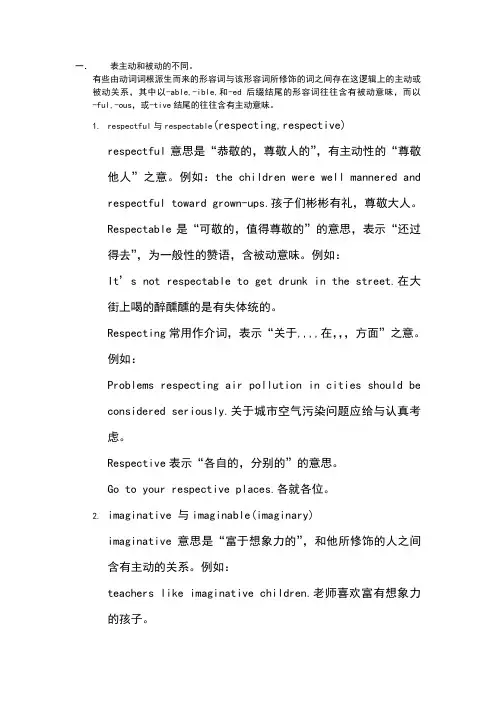
一.表主动和被动的不同。
有些由动词词根派生而来的形容词与该形容词所修饰的词之间存在这逻辑上的主动或被动关系,其中以-able,-ible,和-ed后缀结尾的形容词往往含有被动意味,而以-ful,-ous,或-tive结尾的往往含有主动意味。
1.respectful与respectable(respecting,respective)respectful意思是“恭敬的,尊敬人的”,有主动性的“尊敬他人”之意。
例如:the children were well mannered and respectful toward grown-ups.孩子们彬彬有礼,尊敬大人。
Respectable是“可敬的,值得尊敬的”的意思,表示“还过得去”,为一般性的赞语,含被动意味。
例如:It’s not respectable to get drunk in the street.在大街上喝的醉醺醺的是有失体统的。
Respecting常用作介词,表示“关于,,,,在,,,方面”之意。
例如:Problems respecting air pollution in cities should be considered seriously.关于城市空气污染问题应给与认真考虑。
Respective表示“各自的,分别的”的意思。
Go to your respective places.各就各位。
2.imaginative 与imaginable(imaginary)imaginative 意思是“富于想象力的”,和他所修饰的人之间含有主动的关系。
例如:teachers like imaginative children.老师喜欢富有想象力的孩子。
Imaginable意思是“可想象的”,还有可以被想象出来的意思,即被动意味。
例如:This is the only solution imaginable.这是唯一可想象的解决办法。
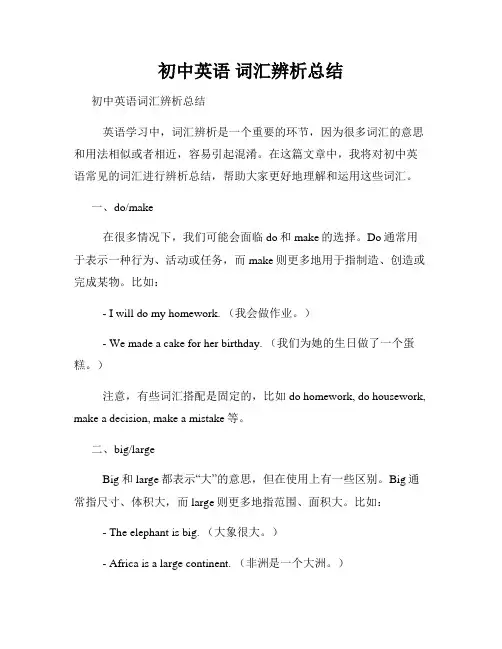
初中英语词汇辨析总结初中英语词汇辨析总结英语学习中,词汇辨析是一个重要的环节,因为很多词汇的意思和用法相似或者相近,容易引起混淆。
在这篇文章中,我将对初中英语常见的词汇进行辨析总结,帮助大家更好地理解和运用这些词汇。
一、do/make在很多情况下,我们可能会面临do和make的选择。
Do通常用于表示一种行为、活动或任务,而make则更多地用于指制造、创造或完成某物。
比如:- I will do my homework. (我会做作业。
)- We made a cake for her birthday. (我们为她的生日做了一个蛋糕。
)注意,有些词汇搭配是固定的,比如do homework, do housework, make a decision, make a mistake等。
二、big/largeBig和large都表示“大”的意思,但在使用上有一些区别。
Big通常指尺寸、体积大,而large则更多地指范围、面积大。
比如: - The elephant is big. (大象很大。
)- Africa is a large continent. (非洲是一个大洲。
)三、happy/gladHappy和glad都表示“高兴的”意思,但在使用上有细微差异。
Happy更通用,可以用于形容各种情绪的高兴,而glad则更强调突发的高兴、出乎意料的喜悦。
比如:- I am happy to see you. (见到你我很高兴。
)- We are glad to hear the news. (听到这个消息我们很高兴。
)四、buy/purchaseBuy和purchase都表示“购买”之意,但buy更常用,更口语化,而purchase则更正式一些。
在日常交流中,我们通常使用buy。
比如: - I bought a new book. (我买了一本新书。
)- He purchased a car last week. (他上周购买了一辆车。
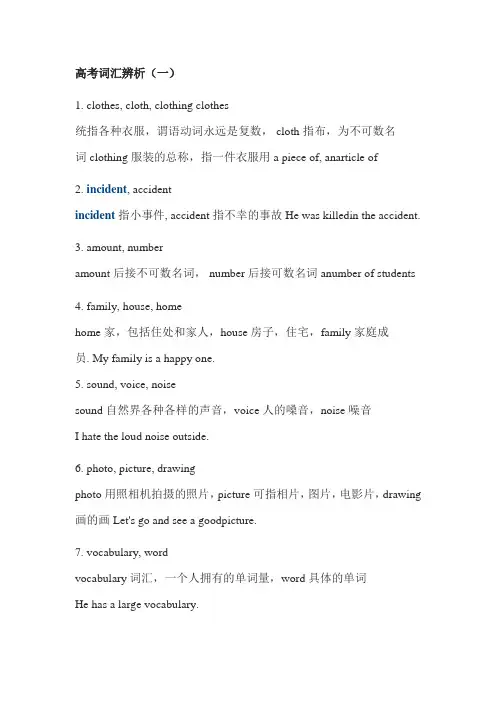
高考词汇辨析(一)1. clothes, cloth, clothing clothes统指各种衣服,谓语动词永远是复数, cloth指布,为不可数名词 clothing 服装的总称,指一件衣服用a piece of, anarticle of2. incident, accidentincident指小事件, accident指不幸的事故He was killedin the accident.3. amount, numberamount后接不可数名词, number后接可数名词 anumber of students 4. family, house, homehome 家,包括住处和家人,house房子,住宅,family家庭成员. My family is a happy one.5. sound, voice, noisesound自然界各种各样的声音,voice人的嗓音,noise噪音I hate the loud noise outside.6. photo, picture, drawingphoto用照相机拍摄的照片,picture可指相片,图片,电影片,drawing 画的画 Let's go and see a goodpicture.7. vocabulary, wordvocabulary词汇,一个人拥有的单词量,word具体的单词He has a large vocabulary.8. population, peoplepopulation人口,人数,people具体的人 China has a large population.9. weather, climateweather一天内具体的天气状况,climate长期的气候状况 The climate here is not good for you.10. road, street, path, wayroad具体的公路,马路,street街道,path小路,小径,way道路,途径 take this road; in the street, show me the way to the museum.11. course, subjectcourse课程(可包括多门科目),subject科目(具体的学科)a summer course12. custom, habit custom传统风俗,习俗,也可指生活习惯,后接to do, habit生活习惯,习惯成自然,后接of doing. I've got the habit of drinking a lot.13. cause, reasoncause 指造成某一事实或现象的直接原因,后接of sth./doing sth,reason用来解释某种现象或结果的理由,后接for sth./doing sth. the reason for being late14. exercise, exercises, practiceexercise运动,锻炼(不可数),exercises练习(可数),practice(反复做的)练习 Practice makesperfect.15. class, lesson作"课"解时,两者可以替换.指课文用lesson. 指班级或全体学生用class. lesson 6; class 516. speech, talk, lecturespeech指在公共场所所做的经过准备的较正式的演说,talk日常生活中的一般的谈话,讲话,lecture学术性的演讲,讲课 a series of lecture on...17. officer, officialofficer部队的军官,official政府官员 an army officer18. work, job二者均指工作。
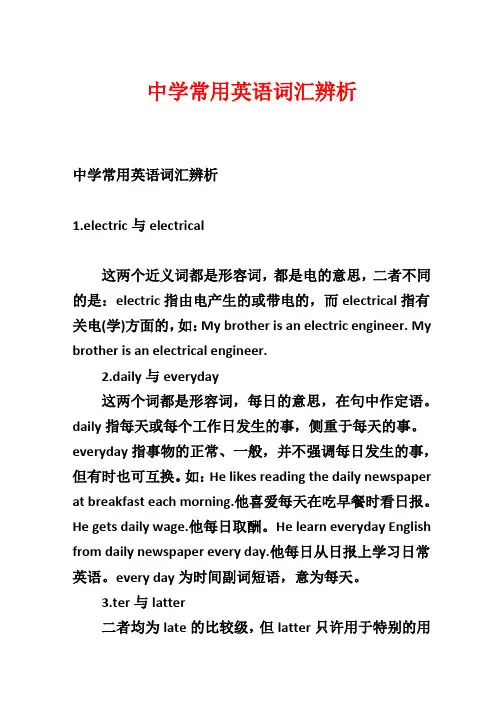
中学常用英语词汇辨析中学常用英语词汇辨析1.electric与electrical这两个近义词都是形容词,都是电的意思,二者不同的是:electric指由电产生的或带电的,而electrical指有关电(学)方面的,如:My brother is an electric engineer. My brother is an electrical engineer.2.daily与everyday这两个词都是形容词,每日的意思,在句中作定语。
daily指每天或每个工作日发生的事,侧重于每天的事。
everyday指事物的正常、一般,并不强调每日发生的事,但有时也可互换。
如:He likes reading the daily newspaper at breakfast each morning.他喜爱每天在吃早餐时看日报。
He gets daily wage.他每日取酬。
He learn everyday English from daily newspaper every day.他每日从日报上学习日常英语。
every day为时间副词短语,意为每天。
3.ter与latter二者均为late的比较级,但latter只许用于特别的用法,且不与than连用。
later作形容词或副词时,意为较迟的(地),较后的(地),如:in ones later life在晚年。
He came later than usual.他比平常晚来一点。
latter作形容词时,通常用于名词前,意为后者的,末尾的,如:in the latter part of a speech演说的后半段,the latter half of the year 下半年。
latter还可用作代词,the latter与the former是一组反义词组。
4.pick, pick out, select与choose这几个词都表示选择选择。
pick是口头用语,指无需细致考虑或鉴别就能作出的选择。
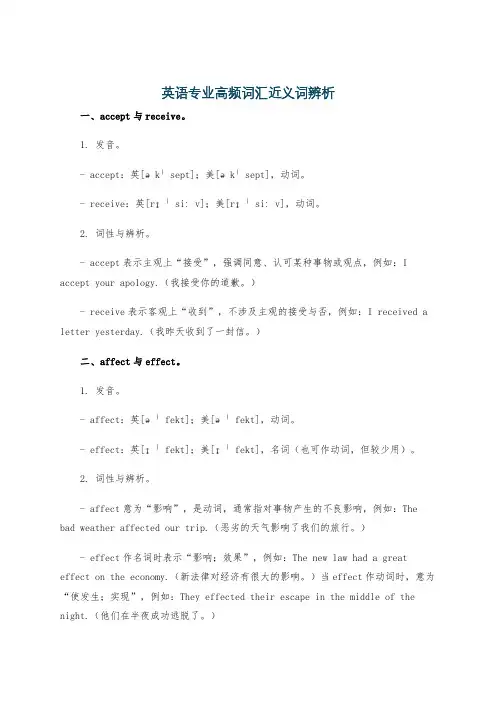
英语专业高频词汇近义词辨析一、accept与receive。
1. 发音。
- accept:英[əkˈsept];美[əkˈsept],动词。
- receive:英[rɪˈsiːv];美[rɪˈsiːv],动词。
2. 词性与辨析。
- accept表示主观上“接受”,强调同意、认可某种事物或观点,例如:I accept your apology.(我接受你的道歉。
)- receive表示客观上“收到”,不涉及主观的接受与否,例如:I received a letter yesterday.(我昨天收到了一封信。
)二、affect与effect。
1. 发音。
- affect:英[əˈfekt];美[əˈfekt],动词。
- effect:英[ɪˈfekt];美[ɪˈfekt],名词(也可作动词,但较少用)。
2. 词性与辨析。
- affect意为“影响”,是动词,通常指对事物产生的不良影响,例如:The bad weather affected our trip.(恶劣的天气影响了我们的旅行。
)- effect作名词时表示“影响;效果”,例如:The new law had a great effect on the economy.(新法律对经济有很大的影响。
)当effect作动词时,意为“使发生;实现”,例如:They effected their escape in the middle of the night.(他们在半夜成功逃脱了。
)三、alive、live、living。
1. 发音。
- alive:英[əˈlaɪv];美[əˈlaɪv],形容词。
- live:英[lɪv];美[lɪv](作动词时);英[laɪv];美[laɪv](作形容词时),可作动词和形容词。
- living:英[ˈlɪvɪŋ];美[ˈlɪvɪŋ],形容词。
2. 词性与辨析。
- alive表示“活着的”,多作表语,不能作前置定语,例如:The fish is still alive.(这条鱼还活着。
1.I called at his house but was refused_______.A.AdmissionB. accessC. receptionD. admittance选D。
admission 和admittance都是准入的意思,但前者常用于公共场合,后者用在私人场所,access为接近进入,reception为接待接见。
2.I am quite sure that I can ___Michael into letting us use his car tomorrow.A.SpeakB. talkC. tellD. say选B,talk sb. into doing sth.劝说,说服某人做某事3.Cause,reason,excuseThere is no ____for such behavior.Breast cancer is the leading ____of death for American women in their forties.Give me your ___for going.解析:cause of….造成一种事实或现象的原因,起因Reason for…一种看法或行为的理由Excuse借口,辩解(1)If you add 5 to 5,you get 10.把…加到…上面Five added to five is/makes 10.5 and 5 makes/make 10.(2)This will add to trouble.增加(3)His whole school education added up to no more than one year.加起来总共Add up the numbers,and you will get 1 155.真题演练1.The engine of the ship was out of order and the bad weather____ the helplessness of the crew at sea.A.added to B.resulted from C.turned out D.made upA add to是增加的意思,原句想表达的意思应该是: 坏天气使得海上船员们更加感到无助result from 由...导致,这里坏天气当然不可能是由船员们的无助所导致的,因果倒置turn out 结果是... 与句子意思不符make up 编造,虚构与句子意思不符agree on 就…达成了共识agree to do sth.同意做某事agree to the plan/decision/arrangementsb. agree with + sb. / sb.’s opinion / what …同意某人意见sth. agree with sb.适合sth. agree with sth.相一致,相符,和谐(5)I don’t agree with yon/what you said/your advice.同意The climate here doesn’t agree with me.食物、天气等适合某人Your story agrees with what I have already heard.和……一致真题演练1. Mutton doesn’t _____him.2. The verb _____ its subject in number and person.3. — when did you last hear ______ Jay?— He phoned me this morning, and we agreed ______ a time and place to meet.A. of, toB. about, withC. from, withD. from, on4. You look well. The air and the sea foods in Sanya must _____ you, I suppose.A. agree withB. agree toC. agree onD. agree aboutbreak away from 摆(逃)脱,脱离,破除break down (机器、车辆等)出故障;(身体)垮掉;感情失去控制;谈判失败;分解break forth 迸发,突然break in 强行进入,插嘴,break into破门而入,打断break into tears / laughter 突然大哭/ 大笑break off突然停止(中断),打断,折断break out(战争火灾瘟疫)爆发,突然发生break through 突破,打破break up分手断绝关系;打碎撞碎;驱散;婚姻的破裂解体;停课解散break the ice = break silence打破沉默/僵局break the law / rules 违反法律/规则break a promise 违背诺言break a record 打破纪录(1)I am sorry that I broke my promise.违背,违反=break one’s word(2)His health broke.(身体或精神)垮了(3)He broke away from all his old friends断绝来往(4)I should break away from such habits改掉(5)All our plans broke down.The peace talks have broken down.(计划、谈判等)失败Chemicals in the body break down our food into useful substances.分解(6)The thieves planned to break into a bank.闯入,破门进入(7)The Second World War broke out in September 1939.爆发(8)After midnight,the party broke up.散(会)(9)I broke up the candy and gave each child a small piece.分开The crowd broke up.分开,分散(10)broken English蹩脚英语真题演练1.Our troops had little difficulty in breaking through the lines of the police.突破News reports say peace talks between the two countries ________ with no agreement reached.A. have broken downB. have broken outC. have broken inD. have broken up析:答案是A。
英语相似词汇辨析(1):yung,youthyoung,youthful用作形容词时,young很易和另一形容词youthful混淆不清。
Young指年轻、年青,词义范围较广,既可以用于人和动物,也可以用于植物、国家、政党和机构等词;有时它亦可用作引申义,指不够成熟或缺乏经验。
例:This Miss Hong Kong is quite young.这位香港小姐很年轻。
This country,though young,has undergone many changes.这个国家尽管年轻,但已经历了许多变化。
We should take good care of the young animals.我们应当好好地照料那些幼小动物。
That is a young institution.那是一个成立不久的机关。
She is young in teaching.她教书没有经验。
He is young at the work.他对那项工作是个生手。
Youthful的意思是少壮的、壮盛的、年轻力壮的,它是个褒义词,表示美好的意味,特指精神、容貌、体力、热情等方面而言。
例:Mr.Wang is a middle-aged man of youthful appearance.中年的王先生的相貌看起来很年轻。
Those are our youthful sports.那些是我们少年时代的游戏。
The old mans youthful spirits were the envy of all.那个老人的活泼精神是我们大家所羡慕的。
Young除作形容词外,尚可用作名词,指动物的幼雏。
例如:to be with young 怀孕to bring forth young 分娩two young at a birth 一胎生两个。
英语专四词汇辨析英语专四词汇辨析英语专四的词汇量还是比较大的,而且有的词汇之间比较容易混淆。
下面,店铺就为整理了一些英语专四词汇辨析,希望对大家有用。
英语专四词汇辨析11、beat, win, conquer, defeat, overcome这组词均有“获胜,征服,击败”之意。
beat 指在战争、竞赛或其他方面最终彻底战胜对方,对象可以是人,也可以是物。
win 指在竞赛或战斗中击败对方,其对象一般应是物,如battle, race, victory等。
conquer 既可指靠武力或精神道方面的力量使对方屈服,又可指在排除障碍和阻力后取得胜利。
defeat 意为“击败”,强调的是暂时的胜利。
overcome 既可指在战斗和竞赛中战胜对方,也可指在感情、习惯等方面压倒,胜过。
如:We can easily beat you at baseball. 打垒球我们可以轻易地击败你们。
The Chinese team won in the end. 最后中国队赢了。
The Normans conquered England in 1066. 1066年,诺曼底人征服了英格兰。
He defeated his opponents in this election. 在这次竞选中,他击败了对手。
He made efforts to overcome every difficulty. 他努力克服每一个困难。
2、award, reward这组词均含有“授予,给予”的意思。
award 意为“授予,给予”,通常指官方或法院根据规定把钱财等奖给或判给某人。
reward 意为“酬劳,奖赏”,通常指因做了某一件事或提供了某种服务而应得到的报答或酬谢。
如:He was awarded a medal for his outstanding contribution to science. 由于对科学作出了杰出贡献,他被授予一枚奖章。
外教一对一英语词汇辨析一.technological, technical这是一组形近易混词。
1. technological [ˌtɛknəˈlɑdʒɪkəl]a.技术上的a major technological breakthrough主要技术性突破I think Israel tends to be at the leading edge of technological development. 我认为以色列在技术发展领域往往处于最前沿。
2.technical [ˈtɛknɪkəl]a.技术的,工艺(学)的;专门的,深奥的。
He's just written a book: large format, nicely illustrated and not too technical. 他刚出了本书:大开本,插图精美,专业性也不太强。
二.transaction, transition, transmission, transformation, transfer1.Transaction [trænˈsækʃən, -ˈzæk-]n.交易行为,处理 A transaction is a piece of business, for example an act of buying or selling something.Synonym: dealingThey have made huge profit out of the transaction.他们从这笔交易中获得了巨额利润。
2.Transition [trænˈzɪʃən, -ˈsɪʃ-]n. (从一种情况到另一种的)过渡,更替 Transition is the process in which something changes from one state to another.Synonym: conversion; change overInevitably the transition will yield some sticky moments过渡时期难免会出现一些困难的时候。
中考英语重点词汇辨析1.a bit/ a little(1)这两个词都意为“一点儿”有时可以互换,但有时不能。
Ⅰ.二者都可作程度副词修饰动词,形容词、副词或其比较级;意义相同,为“一点儿”“有些”。
如:①I am a bit / a little hungry.我有点饿。
②He walked a bit / a little slowly.他走路有点慢。
Ⅱ.二者都可以用作名词词组,充当主语或宾语。
如:① A little / bit is enough for me.我有一点儿就够了。
② I know only a little / a bit about her.我对她的情况只了解一点。
Ⅲ.区别:(1) a little可直接修饰名词;a bit后须加of才可以。
如:①.There is a little water in the bottle.= There is a bit of water in the bottle.[注意] a little of 后的名词通常特指,表“……中的一些”,如:①May I have a little of your tea? 我能喝一点你的茶吗?(2)否定形式的用法不同:not a little 作状语,相当于very/ quite, “很”,“非常”;作宾语时,相当于much/a lot, 意为“许多”。
而not a bit 作状语时,相当于not at all, 意为“一点也不”,作宾语时则相当于not much.例如:①He is not a little hungry.= He is very hungry.他饿极了。
②He is not a bit hungry.=He is not hungry at all.他一点也不饿。
③She ate not a little.=She ate a lot.她吃得很多。
not a bit中的not 可以分开使用;not a little中的not 则不能分开。
英语重点词汇3类英语单词辨析解析一、影响:1. Impact-----侧重带来强烈性的冲击2. Influence----是指思想、行为、性质或发展和成长等发生变化的影响。
它可以指坏的影响,也可以指好的影响,这种影响常是潜移默化3. Effect (n.)----侧重影响的结果-多用作名词4. Affect(v.)----带来结果-多用作动词Eg: The labour enthusiasm of the workers strongly influenced us.工人们的劳动热情强烈地感染了我们。
The surroundings in which a child grows up may have an effect on his development.小孩生长的环境会影响他的发展。
Technology has had an irreversible impact on society. 技术已对社会产生不可逆转的影响。
Your attitude will affect how successful you are.你的态度会影响你成功的程度。
二、rise、arise、raise、arouse 四个词看起来很像,其实差别很大。
首先,rise, arise 是不及物动词,raise, arouse是及物动词。
(1)rise(rose, risen)vi. 上升,升起, 升高;上涨;起立,起身;起床说明主语自身移向较高位置,常用于日、月、云、雾、烟、蒸汽、河水、温度、物价等,无被动语态。
Eg:The sun rose at seven o’clock. 太阳七点钟升起。
The moon has risen above the hills. 月亮已经从山上升起。
The river has risen by several meters. 河水上涨了好几米。
(2)arise (arose, arisen) vi.(问题,困难等)出现;发生,产生;主语一般为抽象名词,如problem, trouble, quarrel, difficulty, misunderstanding, disagreement起身;起来;起立。
glare, flare, flash, gleam, glitter 这5个词做“闪光”解时的区别1.glimpse主要是指“看、一瞥”而不是主要指“闪光”,glimpse指“闪光”已经是古语(Archaic 【古语】A brief flash of light.闪光短暂的闪光)的用法,会出现在古诗和古散文中2.glare既可指“瞪眼”也可指“强光”3.sparkle即可指“(迸发)火星”也可指(酒等的)气泡4.glow即可指“强光”也可指“鲜艳夺目的颜色、红润的脸色”等,意义中只表示“闪光”的很少,你可以结合它们的引申义来记住这些单词,5.glare,被人“瞪眼”的时候就感觉仿佛被“强光”照射一般令人不自在,试比较:the glare of the footlights 舞台上耀眼的灯光;in the full glare of publicity 非常显眼,在众目睽睽之下。
--------glare指太阳等发强光The sun glared out of the blue skyGleam 指月亮等发微光The moon gleamed on the lakeGlitter 指珠宝,星辰闪光Glow指(熔铁)发“灼光”Flash 闪光Flare闪耀,闪烁Blink 眨眼,闪亮Shine照耀,发光Spark 流露;显露A small amount of a feeling or quality that can be noticed someone’s express ion or behaviourEg Meg’s eyes lacks their usual spark of humourHis eyes sparked with anger. (他的双眼射出怒火闪闪发光”。
)辨析glisten, glimmer, flicker,glitter,sparkle,twinkle具体用法如下(包括其他发光词):1. dazzle: If a very bright light dazzles you, it stops you from seeing properly fora short time.Dazzle是"刺眼、晃眼"的意思,特别当光线照得人短时间看不清物体时使用,与下文其他的"刺眼"选手颇有区别。
例:a deer dazzled by the headlights2. flash: to shine suddenly and brightly for a short time, or to make something shine in this way; If a light flashes or if you flash a light, it shines with a sudden bright light, especially as quick, regular flashes of light.Flash是快速地发出强光,意为"闪光",是闪光一族的普通意义,后文还有多个闪光词汇。
例:Lightning flashed overhead.3. flicker: to burn or shine with an unsteady light that goes on and off quickly; Ifa light or flame flickers, it shines unsteadily.例:The overhead lights flickered momentarily.Flicker也是闪光,但是与flash闪得不同。
Flash是闪出强光,闪一下马上消失,再接着闪出强光,比如打雷之前的闪电就是典型的flash;flicker也是"闪光门"高手,可是它只能闪出不太强的光,并且极不稳定,闪光时忽明忽暗,译为"闪烁、摇曳",这个词很浪漫,总令人想到Casablanca中迷人的汽车旅馆和那对恋人一起试过的那个long, hot summer's night.4. glare: to shine with a very strong bright light which hurts your eyes; If the sun or a light glares, it shines with a very bright light which is difficult to look at;这个已经不是闪光门弟子了,这是发出非常耀眼的光芒,让眼睛产生不适,且不适效果大大高于dazzle,有可能出现较长时间的失明。
比如氧焊时,如果不戴眼罩看了那种强烈的白光后,好一会儿看不见东西,那就是一种glaring light, 比dazzling light历害多了。
例:The sun glared down on us.5. gleam: to shine softly [= glimmer]; If an object or a surface gleams, it reflects light because it is shiny and clean. Gleam是"发出微光",其微弱程度与下文要提及的glimmer相同,似乎在写作中二者完全可以互换使用,不过“柯林斯”字典告诉我们,glimmer的光有点unsteady,类似于flicker。
Gleam 是稳定的光线,不会晃动。
例:His teeth gleamed under his moustache;Blue-white moonlight gleamed through the window, throwing the shadows of the bars across the floor.淡蓝色的月光透过窗户照进房来,窗条的影子斜斜地映在地板上。
6. glimmer: If something glimmers, it produces or reflects a faint, gentle, often unsteady light; to shine with a light that is not very bright [= gleam]: a weak, glimmering light 朗文字典认为glimmer等于gleam,但是柯林斯和牛津皆认为glimmer含有unsteady之意,是to shine with a faint unsteady light,因此一定要与gleam区别开来。
glimmer与flicker相近,也有“光线晃动”之意,但是没有flicker那么"摇曳"得历害:A beam of gleaming light 一道微弱的光线A beam of glimmering light 一束昏暗、摇曳的光线7. glint: if a shiny surface glints, it gives out small flashes of light [= sparkle]; If something glints, it produces or reflects a quick flash of light. (WRITTEN);= glisten; to produce small bright flashes of light:例:The sea glinted in the moonlight;The sun glinted on the windows;The gold rims of his spectacles glinted in the sun.该词使用场景描述:一群孩子在草丛中玩耍时,突然一个小孩惊叫起来,"看呀,前边草丛里有东西在发亮"。
众人走近一看,原来是一只银戒指;夏日某夜,有淡淡的月光,四周万籁俱寂,我心事重重,独自来到沙滩上,看着黑黝黝的海水,听着潮涨潮落出神。
月亮渐升渐高,月入中天之时,月光不如先前一样昏暗,海面一下子亮了起来,我看见涨潮的时候,海边奔涌着浅灰色的浪花。
以上两个场景是我臆想的,都适用glint这个词。
Glint的关键点是"闪(泛)着微光",并且光线在变幻,我想到了李莫愁的"冰魄银针"在阳光下发出幽蓝幽蓝的光芒,煞是瘆人,这就是glinting的光;小龙女的"玉蜂针"一定不是这种光,而是一种明亮得多的光,可用glowing或者glittering。
突发奇想,glint是否有消极、否定之意呢?比如李莫愁是坏人,她的暗器就发glinting的光,而小龙女是好人,并且这么多人喜爱她,因此她的暗器就不会发出glinting的光。
8. glitter: to shine brightly with flashing points of light [= sparkle];to shine brightly with little flashesof light, like a diamond SYN sparkleGlitter一听就比glint, gleam, glimmer等感觉要好,“阳气”要大得多,是积极的、明亮的,正大光明的。
其发光比较亮丽,常用于阳光照射下物体反光例:The ceiling of the cathedral;glittered with gold;The river glittered in the sunlight.9. glisten: to shine and look wet or oily; If something glistens, it shines, usually because it is wet or oily例:Her eyes were glistening with tears;Sweat glistened on his forehead.;The road glistened wetafter the rain;The boy's back was glistening with sweat;glistening black hair这个词非常浪漫,非常美,往往与水、油等有关。
发出的光令人感觉到湿漉漉的或者油亮油亮的。
第1个例句非常棒,女孩珠泪莹然,楚楚动人的样子真的令英雄魂断,还有美女出浴之后,头发湿湿的,在灯光下就是glistening的感觉,这也令男人意乱情迷。
此处glistened with tears就是那种"闪着眼泪花的感觉";后句"他的额头渗出了汗珠",下一句是"雨后路面湿得发亮"。